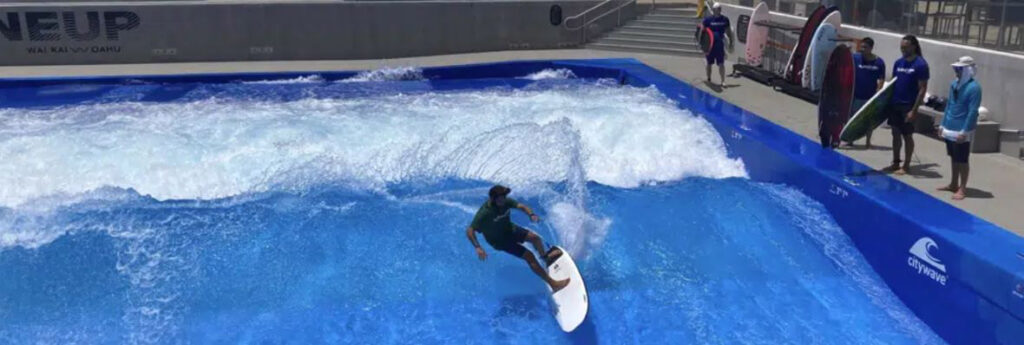Brian Keaulana is the quintessential Native Hawaiian waterman, well-known for his deep understanding of the ocean, gifted with surfing and lifeguarding skills passed down from his big-wave rider father. Now, as one of the islands’ standard-bearers of surfing, Keaulana wants to further boost the sport in his homeland by building an artificial wave pool – a splashy proposal that is making waves, particularly among some Native Hawaiians.
The project has landed in court and reflects the unease some feel about the commercialization of what long has been a cultural touchstone, and raising questions about how a modern-day sport followed by millions worldwide fits into the cultural legacy of islanders who have been riding waves for millennia.
“They’re profiting off a cultural practice by controlling it by making these wave pools, which are going to destroy the actual beach that is nearby,” said Healani Sonoda-Pale, a plaintiff in a civil case seeking to stop the wave pool. “I cannot speak for other Hawaiians. All I can I say is as a Hawaiian… it goes against my culture.”
Surfer and writer Mindy Pennybacker said the controversy highlights a struggle over how to balance tradition with a booming sport. In researching her book, “Surfing Sisterhood Hawai‘i: Women Reclaiming the Waves,” she learned of creative ways Hawaiians compensated when there was no surf, including finding standing river waves or sledding down hillsides.
She also sees how wave pools help athletes improve, noting a World Surf League championship tour competition over Memorial Day weekend at a California wave pool developed by pro surfer Kelly Slater.
“The beauty of surfing, and the frustration of surfing at the recreational and competitive level, remains the unpredictability and how surfers have to have the reflexes to deal with changing conditions,” she said.
The lawsuit – filed in state environmental court by a group of Hawaiians and residents near the proposed site – alleges the 26-million litre artificial pool would damage nearshore limu, or seaweed, and desecrate iwi kupuna, or ancient Hawaiian remains.
Bidding to halt the project, the lawsuit challenges the Hawaii Community Development Authority’s approval and finding that it will have no significant environmental impacts.
The development authority and the state attorney general’s office declined to comment on the lawsuit, which seeks a new environmental review. A hearing is set for July and it’s not clear when a judge might rule.
Sonoda-Pale pointed out that the artificial lagoon would be 3.2 km from a beach called White Plains, long a popular surf spot.
A wave pool recently opened nearby and opponents say another one is unnecessary and a waste of water. But Keaulana remains committed, noting ocean conditions aren’t always ideal for learning how to surf or save lives.
Using the latest technology, the facility would simulate ideal conditions needed to keep top surfers competitive and serve as a “life-saving lab” for teaching safety skills in a controlled setting.
The project also intends to incorporate water conservation and off-the-grid electricity and feature native plants in its landscaping.
Besides a surf lagoon, the 7.6-hectare site also would feature rock climbing, beach volleyball, skateboarding and other activities. The proposed facility is eyeing a summer 2024 opening, though it’s not clear how the lawsuit could affect the timeline.
“We’ve met with a number of Hawaiian cultural advisors and conducted extensive archaeological and environmental studies to ensure that we protect and mālama the site,” said a company statement online, using the Hawaiian word that can mean “to take care of.”
Keaulana said he’s hopeful differences can be worked out with hooponopono, a traditional, culture-based form of mediation. Project opponents say they are open to such a meeting.
“I’m more disappointed in myself. I felt – and we felt – that we’ve pretty much tried to do everything possible,” Keaulana said of concerns about the project. “I just feel to be Hawaiian is to meet up and work your differences and problems out.”

